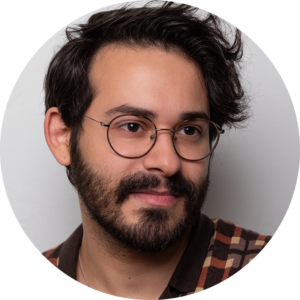Queer activists gather in NYC to support Ukraine — Jewishly

A man holds a sign in support of queer Ukrainians at the Stonewall Inn on February 26, 2022. By Nora Berman
“Queer people anywhere are responsible for queer people everywhere,” a sign read outside of the Stonewall Inn in New York City Saturday afternoon, where activists gathered outside of the historic LGBTQ+ rights landmark to express solidarity with marginalized Ukrainians as they face persecution under the invasion of Russian troops that began earlier last week.
In 1969, the Greenwich Village bar became the site of demonstrations against police brutality toward New York’s gay community, and is frequently regarded as the birthplace of the queer liberation movement. Now, New Yorkers leveraged the symbolism of Stonewall to call attention to the risks that LGBTQ+ Ukrainians face under the military operation that Russian president Vladimir Putin claimed was meant to “de-nazify” the sovereign nation led by Jewish president Volodymyr Zelensky.
During the Holocaust, between 1.2 and 1.6 million people were killed by the Nazis in Ukraine. Multiple Jewish organizations have spoken out in recent days disavowing Putin’s assertion that Ukraine is run by neo-Nazis, with Yad Vashem stating that “the propagandist discourse accompanying the current hostilities is saturated with irresponsible and completely inaccurate comparisons with Nazi ideology and actions before and after the Holocaust.”

A man holds a sign comparing Vladimir Putin to Adolf Hitler at the Stonewall Inn on February 26, 2022. By Nora Berman
While the event made no explicit mention of the risks facing Jewish Ukrainians during the Russian invasion, speakers framed Ukraine’s queer community as a bellwether that could hint at the future of all minority groups in the country — echoing the history of both communities in Ukraine and across Europe at-large.
Led by the group QUA — LGTBQ Ukrainians in America, speakers at the Stonewall Inn warned against the dangers of Russian misinformation campaigns, and stressed the importance of different groups standing together to support Ukraine and call on the United States to provide more aid to the nation.
Bogdan Globa, co-founder of QUA, tearfully opened the rally with sincere thanks for all who had gathered, explaining that all the videos and photos from the event would be shared with his queer Ukrainian friends who were in hiding.
“It will be very, very important for them to see you supporting them, and you’re thinking of them in this dark time.” Globa noted that he had spoken that morning with a gay friend of his in hiding in Kharkov who was running out of food.

Geva Zeichner stands at the Stonewall Inn on February 26, 2022 with a sign showing his three identities as Israeli, American and queer. By Nora Berman
In the crowd, Israeli-American Geva Zeichner held a sign with American, Israeli and pride flags, explaining that it represented all parts of his identity.
“Israel was in a similar situation in its origin, and Europe and America came to our aid,” Zeichner told the Forward, elaborating that he felt it was important to stand up for marginalized people.
A Russian LGBTQ activist and asylum-seeker passionately spoke of “how ashamed I am to have a Russian passport. Russia is bombing our brothers and sisters, our siblings.”
Since 2013, when Russia passed a law banning “gay propaganda” that resulted in increased violence against queer people, rhetoric against the community has become more extreme.
In contrast, Globa elaborated on queer life in Ukraine, painting a picture of a liberal nation.
In 2016, the Ukrainian Parliament passed a law that not only permitted gay and bisexual men to donate blood (something that is still illegal in the US unless the donors have not had sexual intercourse with men for three months), but also simplified access to gender-affirming medical transition for transgender people.
“Yes, gay marriage is still not legal in Ukraine,” Globa announced, “but the US only passed same-sex marriage in 2015, and how many years has it been a country, over 250? Ukraine has been a democracy for three decades.”
Power as a community
One by one, speakers draped in Ukrainian flags or wearing blue and yellow, spoke forcefully about the inherent power of each of the nearly 500 individuals present at the rally. An immediate no-fly zone over Ukraine to halt aerial bombardment, harsher sanctions and increased state quotas for refugee resettlement were among the many action items that the rally’s leaders called for.
Andrij Dobriansky, director of the Ukrainian World Congress Mission to the United Nations, told these reporters that his office’s first priority in helping people is to guarantee a special immigration status for those on Russian “kill lists” — marginalized people who would be killed or detained in secret prisons, like those in Russian-controlled Chechnya.
City Councilman Erik Bottcher, whose district encompasses Chelsea and the part of the West Village where the Stonewall Inn is located, emphasized the massive power that the queer community in New York possesses and urged the crowd to use it.
“We are here at the Stonewall Inn, the birthplace of the modern LGBT rights movement. We [the LGBTQ community] are very powerful here in New York, so let’s use the power that we have, the voice that we have, to speak out against what is happening abroad and in support of Ukraine, full stop.”
“There is no peace in Ukraine, it’s gone,” Maryna Prykhodko of Razom said bluntly. “But you need to do something to get it back.”

A Ukrainian woman wearing a floral headdress looks on at the rally at the Stonewall Inn on February 26, 2022. By Nora Berman





















